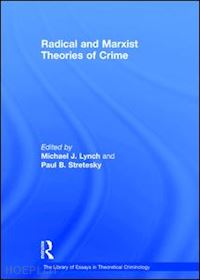Contents: Introduction; Part I Definitions and Background: Social class and the definition of crime, Herman Schwendinger and Julia Schwendinger; From 'crime' to social harm?, Paddy Hillyard and Steve Tombs; Critical criminology and the critique of domination: the story of an intellectual movement, Raymond J. Michalowski; Toward a political economy of crime, William J. Chambliss; The value of quantitative analysis for a critical understanding of crime and society, Steven E. Barkan; Toward a Marxian theory of deviance, Steven Spitzer. Part II Varieties of Radical/Marxist Criminology: The tasks facing a realist criminology, Jock Young; The state of the criminology of crimes of the state, Dawn L. Rothe and David O. Friedrichs; Corporate violence against Canadian women: assessing left-realist research and policy, Walter S. DeKeseredy and Colin Goff; Rape, sexual inequality and levels of violence, Julia Schwendinger and Herman Schwendinger. Part III Explaining Crime: Class and the economics of crime, David M. Gordon; A cross-national test of Bonger's theory of criminality and economic conditions, Olena Antonaccio and Charles R. Tittle; A tale of two capitalisms: preliminary spatial and historical comparisons of homicide rates in Western Europe and the USA, Steve Hall and Craig McLean; The rate of surplus value and crime: a theoretical and empirical examination of Marxian economic theory and criminology, Michael J. Lynch, W. Byron Groves and Alan Lizotte; A critique of criminology: toward an integrated structural-Marxist theory of delinquency production, Mark Colvin and John Pauly; Delinquency and the age structure of society, David F. Greenberg; Poverty, inequality and youth violence, Ronald C. Kramer. Part IV Social Control: Policing and Punishment: Unemployment, imprisonment and social structures of accumulation: historical contingency in the Rusche-Kirchheimer hypothesis, Raymond J. Michalowski and Susan M. Carlson; The Buffalo police, 1872-1900: labor unrest, politi











